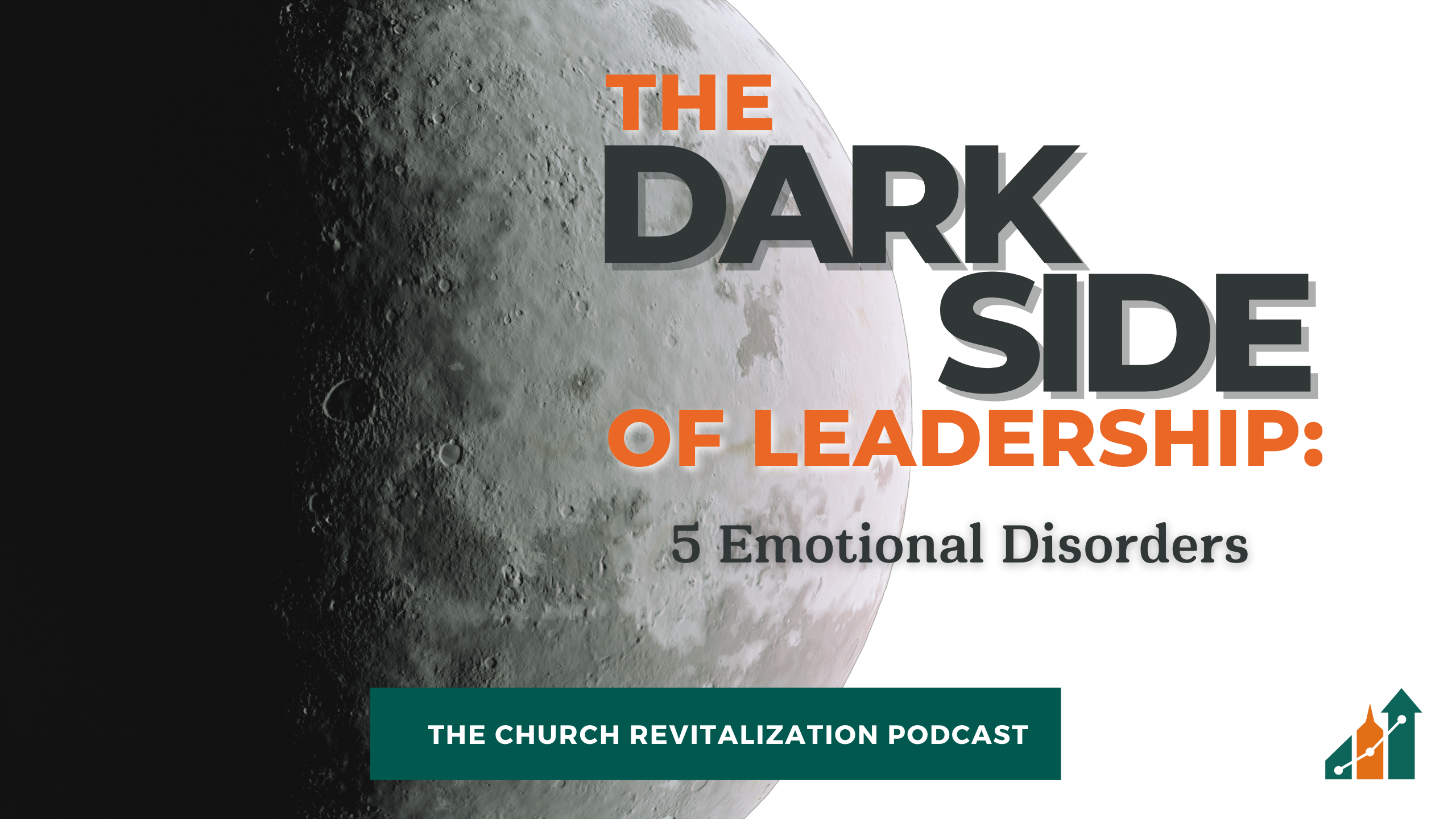The Church Revitalization Podcast – Episode 183
Being elevated to a leadership position does not make anyone immune to being emotionally unhealthy. Likewise, leadership promotions should not be taken as an affirmation of a clean bill of emotional health. If so, we’d rarely see leaders with issues noted below, but we do.
If instead you’ve found yourself getting passed over for promotions, found it difficult to maintain employment for long periods of time or find yourself always at odds with your co-workers, then undergoing some assessments about your emotional well-being may be warranted.
This week on the Church Revitalization Podcast we talk through five common emotional disorders that can hold people back from excelling as a leader and leading effective teams.
The following is an excerpt from Developing Emotionally Mature Leaders by Aubrey Malphurs.
Subscribe below to never miss an episode.
The Obsessive-Compulsive Leader
Obsessions are unwanted, harmful, time-consuming thoughts, images or emotions (fear, doubt, disgust, etc.) that consume a person, won’t go away, and leaves him or her feeling out of control. Compulsions are repetitive thoughts or behavior one engages in to hopefully make their obsessions go away at least temporarily.
At the heart, obsessive-compulsive leaders have a compulsive drive to be in complete control of their circumstances. This is because they feel out of control. What follows are compulsions that people use to deal with their obsessions or unwanted feelings.
In a church or some other ministry context obsessive-compulsives may strive to be totally in control of the church and all that takes place, find it difficult to delegate, push the value of excellence to extreme perfectionism, spend long hours at the church, find it difficult to relax, are critical of themselves and others, and can explode in anger.
A possible biblical example of an obsessive compulsive may have been Moses. In Exodus 18 we see that he was totally in control, attempted to minister to the people from morning to evening (Ex.18:14), and found it difficult to delegate (Ex.18:17-23). He was also subject to outbursts of anger as in Ex. 2:11-12 and 32:19-20.
The Narcissistic Leader
As with Narcissus of Greek mythology, the narcissist is obsessed with his or her self-image. They’re in love with themselves for unhealthy reasons. For example, they like what they see when they look in a mirror. In short the world revolves around them.
They view themselves as inherently better than others and thus have an over-inflated sense of importance. They feel that their business or ministry can’t do without them. They are driven to succeed by their need for admiration and acclaim so they can feel good about themselves. However, they have deep feelings of inferiority, and feeling good about themselves is how they address this, including the behavior below.
They are obsessed with knowing how others feel about their work or performance. However, they have difficulty accepting criticism, are easily hurt, and may react with anger, shame, or humiliation. They may be jealous of the success of others. Success or failure strongly affects their self-worth. And they enjoy recognition for their accomplishments from their peers and others.
They may take advantage of others to reach their own goals and exaggerate their own importance. They lack empathy and disregard the feelings of others. Ultimately they pursue selfish goals, and may put others down to make themselves look good.
In a church or some other ministry context, narcissists feel that they’re irreplaceable; that the ministry can’t do without them; may not handle formal evaluation well; tend to trust only those who strongly support them; look for praise for their sermons or messages; likes to see and hear his or her name; and wants to see the ministry grow which to them is an outward sign of their success.
A biblical example may have been Solomon. He was obsessed with his self-image and was totally focused on himself. Note the number of times he refers to himself in Ecclesiastes 2:4-8.
The Paranoid Leader
They believe the world is a place of constant threat, and may at times feel persecuted by that world at large. They believe that something bad is always about to happen. They are very suspicious and assume that people, whom they mistrust, are talking ill of them behind their backs. For example, they think that other people are lying or scheming to harm them in some way. Thus they find relationships difficult, don’t trust people, and aren’t willing to confide in anyone.
They are easily offended and find it difficult to cope with any kind of criticism whether formal or informal. They seem always to be on the defensive, and can become hostile, aggressive and argumentative. They believe that compromise is wrong regardless of the context, and they find it difficult to forgive and forget.
In a church or some other ministry context, paranoids believe that their boards or groups of people in the church are meeting behind their back and want to run them off. They are very suspicious of any group meeting without their presence. Thus, they attempt to be present at most if not all committees and other meetings of the ministry. They will not tolerate any kind of formal evaluation of their ministry. They are “lone ranger” leaders who confide in no one, because they trust no one. They carry the preaching load of a pastor, because they fear that an associate might be a better speaker than they are. They are usually overworked because they fear delegating any ministry to others no matter how competent others might be. They tend to hire weak staff who are less competent than they are which means Job security for them.
A biblical example may have been Saul. We see evidence for this in 1 Sam. 18:7-9 where after David’s defeat of the Philistines, the women came out into the streets and danced and sang, “Saul has slain his thousands, and David his tens of thousands.” According to the text this angered Saul (verse 8) and he became jealous of David and feared him. This led to a number of attempts on David’s life as recorded in 1 Samuel 19.
The Codependent Leader
Codependency is defined as a relationship in which a person affected with a pathological condition (narcissism, drug addiction, etc.) controls and manipulates another who depends on them for some emotional need as well. It often involves placing a lower priority on one’s own needs, while being excessively preoccupied with the needs of others. Both are dependent people who rely in some way on the other person to meet a perceived need. For example, codependents who may be experiencing a major pathological condition need other people to like them to feel okay about themselves. They’re afraid of being rejected or abandoned, even if they can function on their own. Others always need to be in a relationship, because they feel depressed or lonely when they’re by themselves for too long. Again, both are dependent people. The way you’re aggressive is by being aggressively passive. Finally, codependents tend to be low self-esteem, set blurry or weak boundaries, desire a certain amount of control over events in their lives, communicate poorly, and live in denial so they don’t have to face their problems.
Codependency can occur in any type of relationship, including family, work, church, friendship, and also romantic relationships. Codependency may also be characterized by denial, low self-esteem, excessive compliance, or control patterns. Narcissists are considered to be natural magnets for the codependent.
In a church or some other ministry context, codependents tend to be people-pleasers. If a power hungry person threatens “my way or the highway,” codependents tend to cave in to “my way.” They want to keep everybody happy which isn’t likely to happen. They tend to view their caretaking role as servant leadership and not a dysfunctional means for meeting their needs. Codependents aren’t good at pursuing and conducting church discipline. Instead, they tend to blame themselves for these situations.
A biblical example may have been Samson. We note in Judges that much of his life he pursued destructive behavior which is typical behavior of codependents (Judges 15-16).
The Passive-Aggressive Leader
The phrase passive-aggressive is used to describe behavior or a personality trait that involves acting indirectly aggressive (passive) rather than directly aggressive. Passive-Aggressive people are aggressive but express it passively or indirectly rather than actively or directly. They are aggressive passively. Passive-aggressive people regularly exhibit resistance to requests or demands from family and other individuals often by procrastinating, expressing sullenness, or acting stubborn.
Passive aggressive people avoid communication when there is something that needs to be discussed. They are notorious for evading problems and issues. They may deliberately stall to prevent an event or some process for change. They fear competition and don’t want to be viewed as not as good as another. They often are chronically late in an effort to control others and their expectations. They are pessimists who fear failure. In a church or some other ministry context, passive-aggressive leaders are not visionaries who look to the future but are non-visionaries who live in the past, much to the delight of some people in the church who are vested in the status quo. They are poor at planning, designing strategies and implementing goals. They tend to be late intentionally to board and committee meetings thinking it will give them an upper hand on an issue. Passive-aggressive people resist any program of formal evaluation.
A biblical example may have been Jonah. McIntosh and Rima write, “In the life of Jonah we see a resistance to God’s demand to perform an assigned task, bursts of sadness and anger, short-lived periods of contrition and sorrow for his actions, impulsive behavior, and a general negativity. Today Jonah would be classified as a passive-aggressive leader.
BONUS: Watch this episode on YouTube.


Scott Ball is the Vice President and a Lead Guide with The Malphurs Group. He lives in East Tennessee with his wife and two children. (Email Scott).

